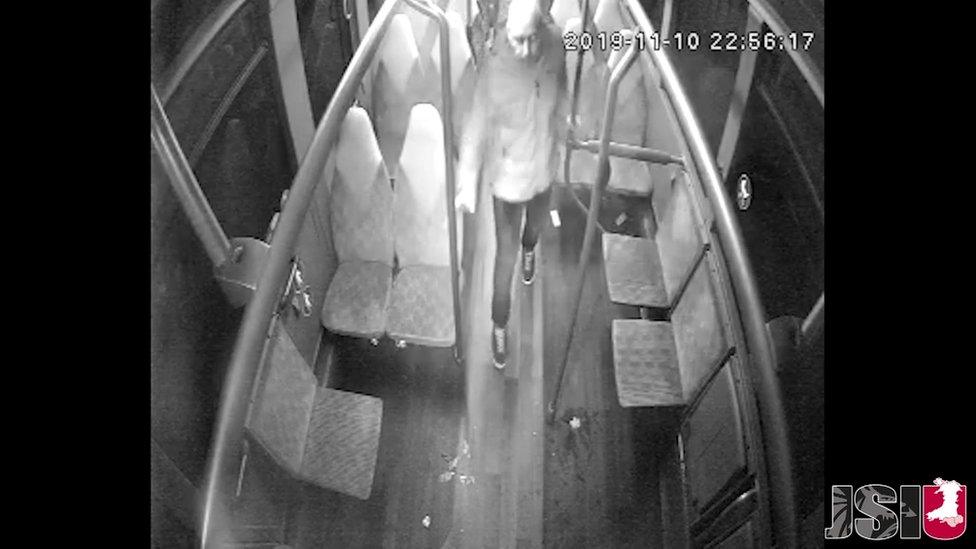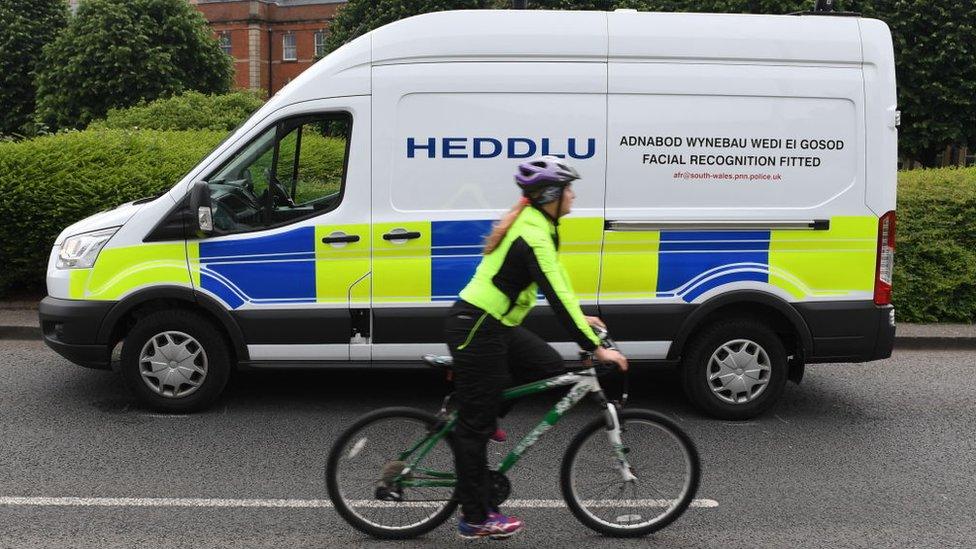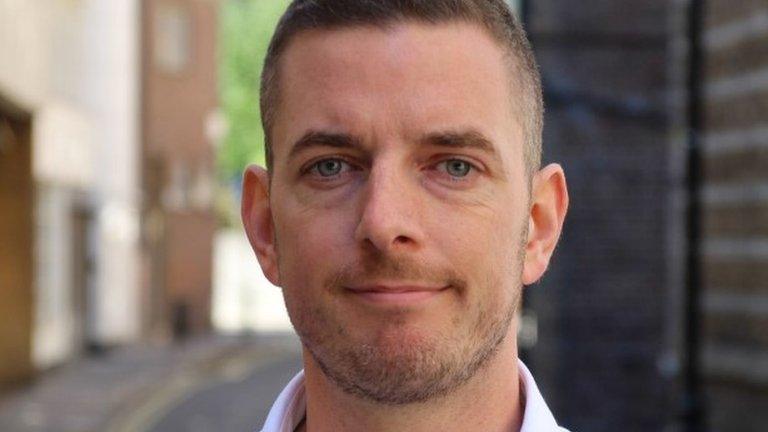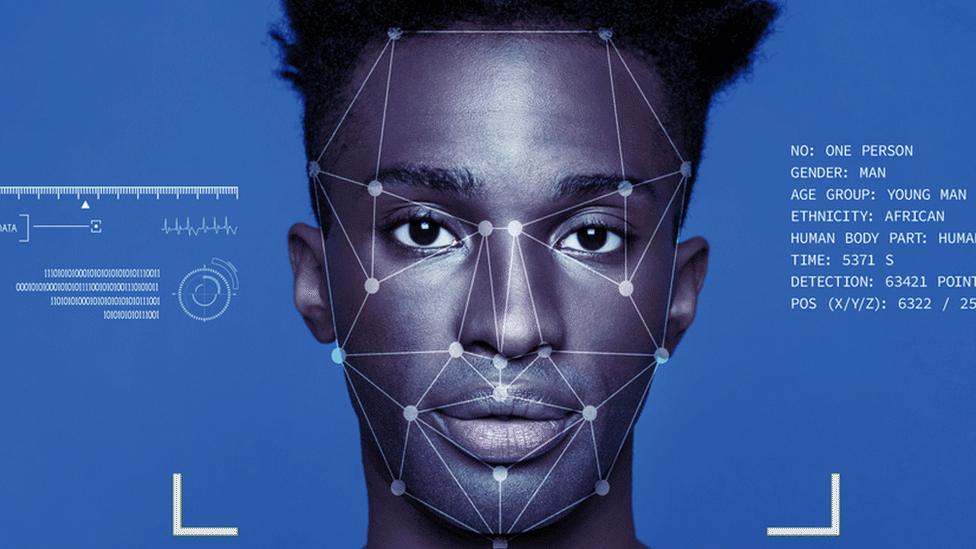Facial recognition: How South Wales Police caught a sexual predator
- Published
A grainy CCTV image was matched with an old custody shot
A grainy image captured by CCTV on a bus was key to catching a sexual predator who has been sent back to prison.
Along with a 14-year-old police custody picture, facial recognition software helped officers track down Craig Walters, a day after he attacked yet another victim.
This time her screams raised the alarm and he was chased off, in Cardiff.
And now Walters, who has already spent half his life in jail for attacks on women, has been sentenced to two life terms, to run concurrently.
Unusually though, it is not for what he did but for what he intended to do to his victim that night, in November 2019.
Shortly before 23:00 GMT, Walters followed his 18-year-old victim as she got off a bus.
Sara - not her real name - was on her way to meet her boyfriend and was unaware she was being followed.

CCTV shows Walters before he got off the bus
"He put his hands over my face and mouth, then he started punching me in my ribs and stomach," Sara remembers.
"I punched him back - I defended myself - and I ended up screaming and someone intervened before it got too far. But I knew straight away what his intentions were - and that's affected me badly."
Despite being chased off by a passer-by, Walters still very nearly got away with it.
"I wasn't going to go to the police that night," she said, explaining it was her boyfriend who insisted she report it.

The software used in this case only looks at those with previous convictions
A resulting police trawl for CCTV came up trumps and investigators were able to show Walters' movements, from following Sara off the bus to the chilling moment he chased her.
It was the image captured on the bus that police were able to use to identify him.
Facial recognition software - measuring his features and comparing them to custody pictures on their database - found a match to a custody picture from 2005.
Unlike the software that was successfully challenged in the courts last year - where all faces in a crowd are analysed - this system looks to see if a suspect is among those with previous convictions.
Ch Insp Scott Lloyd leads on the use of the technology at South Wales Police and said it has transformed their work.
"Before retrospective facial recognition was used, on average it took us 10 days to identify someone," he said.
An image would be passed to local officers, then more widely within the force, perhaps even involving an appeal to the public, to help identify a suspect.
"That now takes us on average about five minutes," he said, stressing that officers use it as part of their decision making, rather than relying on it.
"That early identification helps the investigation quite considerably and it does lots for our victims. It helps bring offenders to justice far quicker and more importantly we can put in place the appropriate protection for the victims of crime."
Last month, Walters pleaded guilty to false imprisonment with intent to commit a sexual offence, but he refused to come up from the cells to be sentenced earlier.
The charge relied on his previous convictions being taken into consideration to prove bad character.
'Prosecuted for sexual intention'
"It's a relatively unusual offence and not one you see regularly prosecuted. It's a difficult offence to prove," said Bethan Evans, crown advocate at the Crown Prosecution Service.
"Given his history and background of offending it was really important, on this occasion, that we got it right and that we prosecuted him for an offence that did reflect that sexual intention."
His previous convictions showed his modus operandi, she said.
"Craig Walters is an individual that has repeatedly, specifically targeted women who have been travelling on their own and in the dark. On each occasion, he has done so in order to carry out a sexual offence," Ms Evans explained.
With that background in mind, it was clear to me that he is a dangerous individual and someone that poses a real risk to women."
Indeed, when he was arrested, police found pictures of other women on Walters' phone, that he had taken from previous bus journeys - each of them seemingly unaware they were being photographed.
The gravity of what could have happened petrifies Sara.
"If it wasn't for the person that intervened - if he hadn't heard me scream for help - the outcome of that night could have been completely different."
'Emotions rip you apart'
Judge Fitton QC described Walters as representing a real danger to women, particularly strangers - "a heavily convicted and committed sexual predator" who showed no remorse.
He told the court that he wasn't surprised Walters refused to come up from the cells to be sentenced.
"You don't want to hear me and these remarks. You know your victim is here in court," Judge Fitton told the defendant in his absence.
"I've no doubt you lack the courage to be seen by her. Instead I will ensure a transcript of these remarks is sent to the prison and probation service so you can read what I am saying about you."
The judge also said Walters would have to serve six years before he can apply for parole.
In her victim impact statement, Sara explained to the court she still has to take the same bus and walk the same street to work.
"I struggled to sleep for a long time - when I do, I regularly have nightmares and wake up covered in sweat, crying," she said.
"Even through the day, my guard is up. I haven't walked anywhere on my own in the early evening since then. A friend has to meet me at the bus stop - the thought of walking alone terrifies me.
"I have this built-up anger, sadness and fear - these emotions rip you apart."
- Published5 August 2020

- Published11 August 2020

- Published20 December 2019
